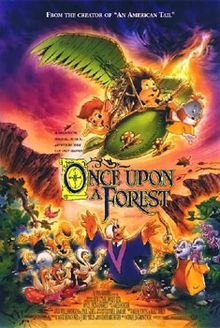
Others simply portray a scenario, and let the lesson teach itself.
A few years ago, I re-watched one of childhood favorites, Once Upon a Forest. The rating on Rotten Tomatoes notwithstanding, I remembered it being good, except for the over-the-top swamp birds.
But as a child, I hadn't fully recognized the emphasis it placed on humanity's impact on animals and the environment.
Looking back, I attribute that largely to the fact that, instead of getting on a soapbox and explicitly lecturing its audience, it simply displayed the experiences that its cast endured as a result of humanity's mistakes.
The characters were likable, and they didn't take a backseat to the lesson that was being taught. The mood of each scene was convincingly set - I never felt like it was simply a vehicle for the writers to grind an ax.
To me, that commitment to maintaining the quality of the story, rather than allowing the tale to be drowned by its own moral like a baby bird in a swamp, was the difference between an enjoyable movie and a lecture with delusions of being a story.
Would I still enjoy Once Upon a Forest, if I watched it today? It's been a while, so it's hard to say, but I like to think I would.
Either way, I consider it a good example of a teaching story that kept its priorities in the right place, and a reminder to me to do the same whenever I want to communicate something through my writing.
Have you ever watched or read a story that you felt was trying too hard to teach its audience a lesson?
What do you think it could have done differently to keep being a good story, while still making its point?
I look forward to reading your comments.


 RSS Feed
RSS Feed